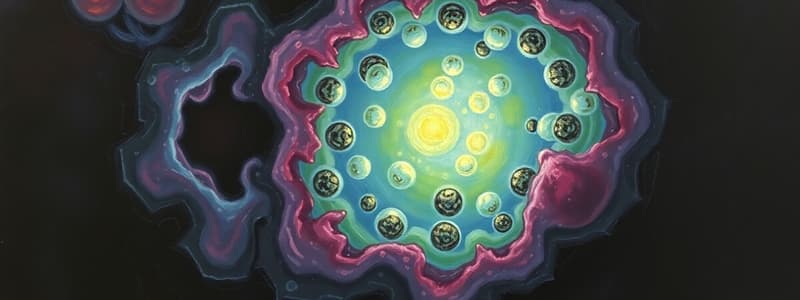Podcast
Questions and Answers
What is the primary function of the nucleus in a cell?
What is the primary function of the nucleus in a cell?
- To serve as a structural framework for the cell
- To control cell activities by directing protein synthesis (correct)
- To store waste products
- To produce energy through cellular respiration
What is the role of the nucleolus within the nucleus?
What is the role of the nucleolus within the nucleus?
- To synthesize lipids
- To regulate the passage of materials
- To produce messenger RNA
- To synthesize ribosomal RNA (correct)
Which cellular organelle is responsible for converting hydrogen peroxide to water?
Which cellular organelle is responsible for converting hydrogen peroxide to water?
- Lysosomes
- Peroxisomes (correct)
- Mitochondria
- Golgi apparatus
What is the structure and function of the centrosome in animal cells?
What is the structure and function of the centrosome in animal cells?
What are the three kinds of fibers that make up the cytoskeleton?
What are the three kinds of fibers that make up the cytoskeleton?
What provides structural support and motility to the cell?
What provides structural support and motility to the cell?
Which of the following statements about microfilaments is true?
Which of the following statements about microfilaments is true?
What feature of the nuclear envelope allows substances to enter and exit the nucleus?
What feature of the nuclear envelope allows substances to enter and exit the nucleus?
What function do intermediate filaments serve in muscle cells?
What function do intermediate filaments serve in muscle cells?
Which of the following structures is composed of tubulin?
Which of the following structures is composed of tubulin?
What is the primary role of the extracellular matrix (ECM) in animal cells?
What is the primary role of the extracellular matrix (ECM) in animal cells?
How do cilia and flagella achieve movement?
How do cilia and flagella achieve movement?
Which of the following best describes the 9 + 2 pattern found in cilia and flagella?
Which of the following best describes the 9 + 2 pattern found in cilia and flagella?
In muscle cell contraction, what role do myosin filaments play?
In muscle cell contraction, what role do myosin filaments play?
What is the function of integrins in the extracellular matrix?
What is the function of integrins in the extracellular matrix?
What characteristic distinguishes microfilaments from other cytoskeletal elements?
What characteristic distinguishes microfilaments from other cytoskeletal elements?
What is the primary function of tight junctions in epithelial cells?
What is the primary function of tight junctions in epithelial cells?
Which type of cell junction is primarily responsible for connecting adjacent cells and ensuring structural cohesion in tissues under mechanical stress?
Which type of cell junction is primarily responsible for connecting adjacent cells and ensuring structural cohesion in tissues under mechanical stress?
During cell fractionation, which component is likely to be rich in ribosomes after centrifugation?
During cell fractionation, which component is likely to be rich in ribosomes after centrifugation?
What role do gap junctions play in animal tissues?
What role do gap junctions play in animal tissues?
In cell fractionation, what is the purpose of homogenization?
In cell fractionation, what is the purpose of homogenization?
Which of the following statements about anchoring junctions is true?
Which of the following statements about anchoring junctions is true?
Which centrifuge setting would be expected to yield a pellet rich in nuclei?
Which centrifuge setting would be expected to yield a pellet rich in nuclei?
What is the primary function of the cytoskeleton in maintaining cell structure?
What is the primary function of the cytoskeleton in maintaining cell structure?
What distinguishes the gap junctions from other types of cell junctions?
What distinguishes the gap junctions from other types of cell junctions?
Which fractional step in centrifugation is typically associated with isolating mitochondria?
Which fractional step in centrifugation is typically associated with isolating mitochondria?
Flashcards
What is the nucleus?
What is the nucleus?
The nucleus is the cell's control center, containing most of the cell's DNA and directing protein synthesis via making mRNA. DNA is associated with proteins in structures called chromosomes. Each chromosome is composed of a single DNA molecule associated with proteins.
What is the nuclear envelope?
What is the nuclear envelope?
The nuclear envelope is a double membrane with pores allowing material to flow in and out of the nucleus. It's attached to the endoplasmic reticulum.
What is the nucleolus?
What is the nucleolus?
The nucleolus is a prominent structure in the nucleus responsible for ribosomal RNA (rRNA) synthesis.
What are peroxisomes?
What are peroxisomes?
Signup and view all the flashcards
What is the cytoskeleton?
What is the cytoskeleton?
Signup and view all the flashcards
What are microfilaments?
What are microfilaments?
Signup and view all the flashcards
What are microtubules?
What are microtubules?
Signup and view all the flashcards
What are centrosomes and centrioles?
What are centrosomes and centrioles?
Signup and view all the flashcards
Actin filaments in muscle cells
Actin filaments in muscle cells
Signup and view all the flashcards
Function of intermediate filaments
Function of intermediate filaments
Signup and view all the flashcards
Function of microtubules
Function of microtubules
Signup and view all the flashcards
How do muscles contract?
How do muscles contract?
Signup and view all the flashcards
What are cilia and flagella?
What are cilia and flagella?
Signup and view all the flashcards
Microtubule arrangement in cilia and flagella
Microtubule arrangement in cilia and flagella
Signup and view all the flashcards
What is the extracellular matrix (ECM)?
What is the extracellular matrix (ECM)?
Signup and view all the flashcards
Function of integrins
Function of integrins
Signup and view all the flashcards
Cell junctions
Cell junctions
Signup and view all the flashcards
Tight junctions
Tight junctions
Signup and view all the flashcards
Anchoring junctions
Anchoring junctions
Signup and view all the flashcards
Gap junctions
Gap junctions
Signup and view all the flashcards
Cell fractionation
Cell fractionation
Signup and view all the flashcards
Homogenate
Homogenate
Signup and view all the flashcards
Differential centrifugation
Differential centrifugation
Signup and view all the flashcards
Supernatant
Supernatant
Signup and view all the flashcards
Pellet
Pellet
Signup and view all the flashcards
Glycoprotein
Glycoprotein
Signup and view all the flashcards
Study Notes
Cellular Organelles
- Cells contain various organelles, including the nucleus, peroxisomes, and the endoplasmic reticulum.
Nucleus
- The nucleus acts as the cell's control center.
- It contains most of the cell's DNA.
- DNA directs protein synthesis through messenger RNA (mRNA).
- DNA is associated with proteins in structures known as chromosomes.
- Each chromosome is made up of a single DNA molecule.
- The nucleus has a double membrane called the nuclear envelope.
- The nuclear envelope contains pores that allow material to enter and exit the nucleus.
- It is connected to the endoplasmic reticulum.
- The nucleolus is inside the nucleus and is responsible for synthesizing ribosomal RNA (rRNA).
Peroxisomes
- Peroxisomes are specialized metabolic compartments.
- They are enclosed by a single membrane.
- They produce hydrogen peroxide.
- They convert hydrogen peroxide into water.
- Peroxisomes carry out various reactions.
Cell Fractionation
- Cell fractionation separates organelles from one another.
- Centrifuges are used to separate cellular components.
- This method allows scientists to determine the function of certain organelles.
- Biochemistry and cytology aid in correlating cell function with structure.
Centrosomes and Centrioles
- Microtubules grow out of centrosomes, which are located near the nucleus.
- Centrioles, consisting of nine triplets of microtubules arranged in a ring, are found in animal cells within the centrosome.
Cytoskeleton
- The cytoskeleton is a network of protein fibers that help organize the cell's structure and activities.
- The cytoskeleton includes microfilaments (actin filaments), intermediate filaments, and microtubules.
- Microfilaments maintain cell shape and are involved in movement.
- Actin filaments and myosin are involved in muscle cell contraction.
- Intermediate filaments maintain cell shape.
- Microtubules provide cell rigidity and serve as tracks for organelle movement.
Cilia and Flagella
- Cilia and flagella are appendages made of microtubules embedded in the plasma membrane.
- They help protists move and they have different specialized functions in multicellular organisms.
- Cilia in the lungs help sweep mucus.
- Sperm cells in animals use flagella for movement.
- Cilia and flagella have a 9 + 2 pattern of microtubule arrangement.
- Dynein proteins are bending motor proteins in cilia and flagella.
Extracellular Matrix
- Animal cells secrete an extracellular matrix (ECM), which helps hold cells together in tissues and supports the plasma membrane.
- The ECM is connected to the cell through glycoproteins and membrane proteins called integrins.
- Integrins connect to the microfilaments of the cytoskeleton, providing structural support.
Cell Junctions
- Specialized junctions between cells allow for communication and adhesion.
- Tight junctions prevent fluid leakage.
- Anchoring junctions link cells and the extracellular matrix.
- Gap junctions allow for the rapid exchange of small molecules.
Studying That Suits You
Use AI to generate personalized quizzes and flashcards to suit your learning preferences.





